tooeitheralsoaswell辨析及练习题
also too either as well的区别和用法
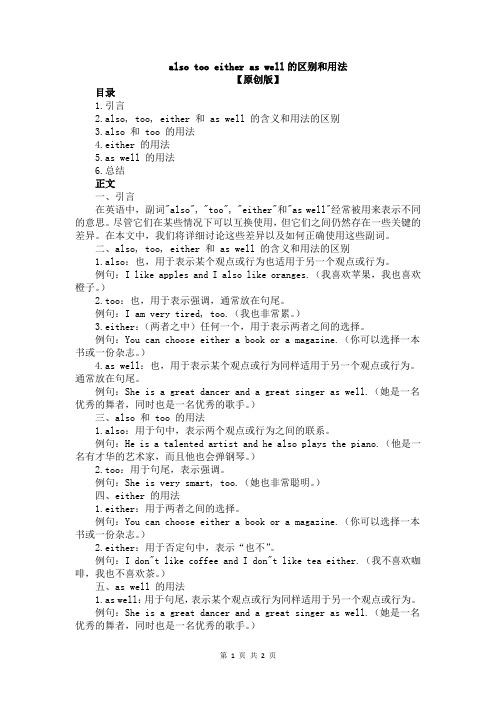
also too either as well的区别和用法【原创版】目录1.引言2.also, too, either 和 as well 的含义和用法的区别3.also 和 too 的用法4.either 的用法5.as well 的用法6.总结正文一、引言在英语中,副词"also", "too", "either"和"as well"经常被用来表示不同的意思。
尽管它们在某些情况下可以互换使用,但它们之间仍然存在一些关键的差异。
在本文中,我们将详细讨论这些差异以及如何正确使用这些副词。
二、also, too, either 和 as well 的含义和用法的区别1.also:也,用于表示某个观点或行为也适用于另一个观点或行为。
例句:I like apples and I also like oranges.(我喜欢苹果,我也喜欢橙子。
)2.too:也,用于表示强调,通常放在句尾。
例句:I am very tired, too.(我也非常累。
)3.either:(两者之中)任何一个,用于表示两者之间的选择。
例句:You can choose either a book or a magazine.(你可以选择一本书或一份杂志。
)4.as well:也,用于表示某个观点或行为同样适用于另一个观点或行为。
通常放在句尾。
例句:She is a great dancer and a great singer as well.(她是一名优秀的舞者,同时也是一名优秀的歌手。
)三、also 和 too 的用法1.also:用于句中,表示两个观点或行为之间的联系。
例句:He is a talented artist and he also plays the piano.(他是一名有才华的艺术家,而且他也会弹钢琴。
)2.too:用于句尾,表示强调。
tooalsoaswelleither的区别

tooalsoaswelleither的区别too also as well either的区别:too作为副词,意为太、过于,用于形容词和副词前;also作为副词,意为而且、也,放在行为动词之前,特殊动词之后;as well意为也、还,常位于句末;either可作代词和副词,意为任何一个、要么要么,常用于否定句,且放句末。
一、too的基本含义及用法介绍too作为副词,意为(用于形容词和副词前)太,过于,过度;也;又;还;(评说某事物使情况更糟)而且。
例句:He's far too young to go on his own.他年纪太小,不能独自一人去。
Can I come too?我也可以来吗?She broke her leg last week─and on her birthday too!她上星期把腿摔断了,而且还是在她生日那一天!I'm not too sure if this is right.这是否正确,我没有太大把握。
二、also的基本含义及用法介绍also作为副词,意为而且;此外;也;同样。
例句:She was not only intelligent but also very musical.她不仅聪明,而且极具音乐天分。
I didn't like it that much. Also, it was much too expensive. 我并不怎么喜欢它。
再说它太贵了。
She's fluent in French and German. She also speaks a little Italian.她的法语和德语讲得流利,也会说一点意大利语。
三、as well的基本含义及用法介绍as well意为也、还。
例句:They sell books as well as newspapers.他们既卖报也卖书。
also too either as well的区别和用法(一)
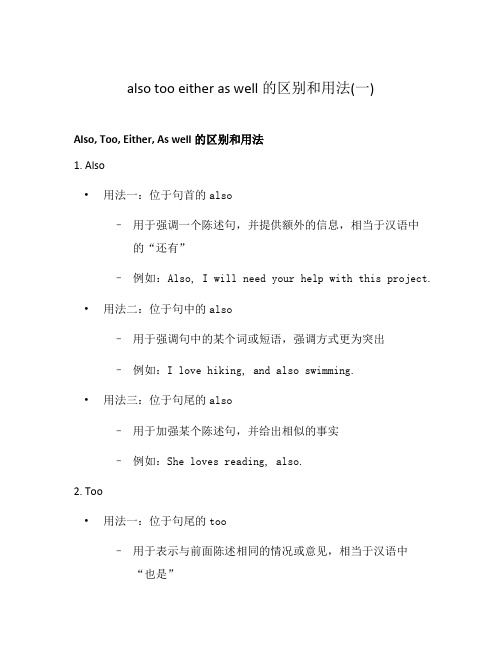
also too either as well的区别和用法(一)Also, Too, Either, As well的区别和用法1. Also•用法一:位于句首的also–用于强调一个陈述句,并提供额外的信息,相当于汉语中的“还有”–例如:Also, I will need your help with this project. •用法二:位于句中的also–用于强调句中的某个词或短语,强调方式更为突出–例如:I love hiking, and also swimming.•用法三:位于句尾的also–用于加强某个陈述句,并给出相似的事实–例如:She loves reading, also.2. Too•用法一:位于句尾的too–用于表示与前面陈述相同的情况或意见,相当于汉语中“也是”–例如:I am tired, too.•用法二:位于句中的too–用于强调句中某人或某物和其他人或物一样–例如:He, too, has a dog.3. Either•用法一:位于句尾的either–用于在否定句中表示两种选择中的任何一种–例如:I don’t like tea, either.•用法二:either…or…–用于表示两种选择之间的关系,相当于汉语中的“要么…要么…”–例如:You can either study or play games.4. As well•用法一:位于句尾的as well–用于表示除了前面提到的情况之外,还有另外一项–例如:I like cooking and gardening as well.•用法二:as well as–用于列举一系列事物时,表示“还有…以及…”–例如:He is good at playing soccer as well asbasketball.以上是also, too, either, as well的常见用法及区别。
通过合理运用这些词语,可以使你的表达更加准确明确。
also, too, either, as well的区别

also, too, either, as well的区别这四个副词均可表示“也”,区别如下:1.too 和as well 多用于口语中,语气较轻,通常用于肯定句或疑问句,一般不用于否定句,且通常放在句末。
如:I like you too [as well]. 我也喜欢你。
Are they coming too [as well]? 他们也来吗?too 有时也紧跟在主语后(注:as well 不这样用),此用法较正式。
如:I, too, know where he lives. 我也知道他住在什么地方。
在Me too, You too 这类简略答语中,通常不用as well, also。
如:A:I’m tired. 我累了。
B:Me too. 我也是。
as well意为“也,又,而且”,意思等同于too,also,但as well只能置于句末。
He speaks English and Spanish as well.他既能说英语, 也能说西班牙语。
There may be travel expense, as well.可能还有旅途费用。
Are they coming as well?他们也来吗?as well也, 还有He speaks English and Spanish as well.他既能说英语, 也能说西班牙语。
2.also 比too 和as well 正式,一般也不用于否定句,它在句中的位置通常是紧靠动词,即放在行为动词之前,特殊动词之后。
有时为了强调也放在句末(但不常见)。
如:He also came. / He came also. 他也来了。
She is young and beautiful,and also rich. 她年轻漂亮,而且有钱。
also 有时用于句首(其后通常有逗号),相当于连词and。
如:Also,his mother was dead. 再说,他母亲又过世了。
as well,either,also,too的区别

as well, either, also, too的区别1.also用于肯定句,既可表示两人干了同样的事,也可表示一个人干了两件事,通常位于be动词,助动词或情态动词之后,行为动词之前。
如:He has been to Beijing. I have also been there.他去过北京,我也去过。
He is good at English. He is also good at Japanese.他擅长英语,也擅长日语。
I also wants some tea.我也要点茶。
注意:表示强调时,also也可放在助动词或情态动词等之前。
比较:I can also do it.我也能干。
I also can do it.(同上)2.too也用于肯定句,比also更通俗,和also, as well可以相互替换,可放在句中,也可放在句末。
如:Xiao Li went to Beijing and Xiao Zhao, too, went to Beijing.小李到北京去了,小赵也到北京去了。
He studies hard and I study hard, too.他学习用功,我(学习)也用功。
3.either用于否定句,而且只能放在句末。
如:He didn’t know it.I didn’t know it either.他不知道那件事,我也不知道。
I can’t speak French and can’t write it, either.我不会讲法语,也不会写法语。
4.as well在口语中用得很多,用法和too完全一样,可以互换,通常位于句末。
[见as well, as well as条]。
如:She not only sings,she plays the piano as well.她不但会唱歌,而且会弹钢琴。
I can do it as well.这事我也能做。
5.在含有责备、抱怨或规劝之类的句子中,若句子本身是以否定的形式表达肯定的意义时用“too”,而不用“either”。
人教版初中英语as well, also, too 以及either高频考点、句型讲练
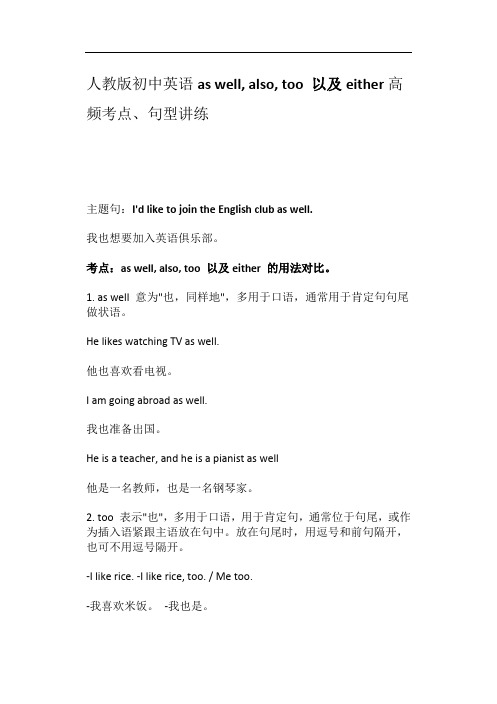
人教版初中英语as well, also, too 以及either高频考点、句型讲练
主题句:I'd like to join the English club as well.
我也想要加入英语俱乐部。
考点:as well, also, too 以及either 的用法对比。
1. as well 意为"也,同样地",多用于口语,通常用于肯定句句尾做状语。
He likes watching TV as well.
他也喜欢看电视。
I am going abroad as well.
我也准备出国。
He is a teacher, and he is a pianist as well
他是一名教师,也是一名钢琴家。
2. too 表示"也",多用于口语,用于肯定句,通常位于句尾,或作为插入语紧跟主语放在句中。
放在句尾时,用逗号和前句隔开,也可不用逗号隔开。
-I like rice. -I like rice, too. / Me too.
-我喜欢米饭。
-我也是。
最新either练习题
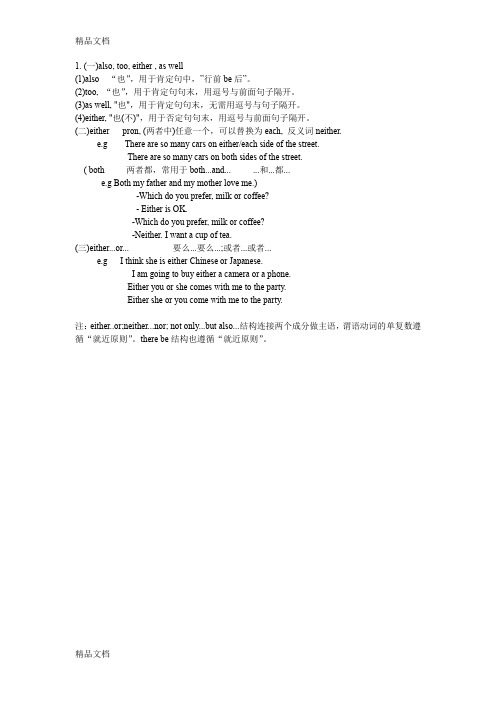
1. (一)also, too, either , as well(1)also “也”,用于肯定句中,”行前be后”。
(2)too, “也”,用于肯定句句末,用逗号与前面句子隔开。
(3)as well, "也",用于肯定句句末,无需用逗号与句子隔开。
(4)either, "也(不)",用于否定句句末,用逗号与前面句子隔开。
(二)either pron, (两者中)任意一个,可以替换为each, 反义词neither.e.g There are so many cars on either/each side of the street.There are so many cars on both sides of the street.( both 两者都,常用于both...and... ...和...都...e.g Both my father and my mother love me.)-Which do you prefer, milk or coffee?- Either is OK.-Which do you prefer, milk or coffee?-Neither. I want a cup of tea.(三)either...or... 要么...要么...;或者...或者...e.g I think she is either Chinese or Japanese.I am going to buy either a camera or a phone.Either you or she comes with me to the party.Either she or you come with me to the party.注:either..or;neither...nor; not only...but also...结构连接两个成分做主语,谓语动词的单复数遵循“就近原则”。
(完整word)also,too,either,neither,so,as well的用法

also,too,either,neither,so,as well的用法1。
also副词“也,而且,并且”用于肯定句或疑问句,但一般位于句中,通常位于be动词,助动词或情态动词之后,行为动词之前。
如:He has been to Beijing. I have also been there.他去过北京,我也去过.He is good at English。
He is also good at Japanese.他擅长英语,也擅长日语。
We are also students。
我们也是学生。
He also went there on foot。
他也是走着去的.Did you also want to have a look?你也想看看吗?I also want some tea。
我也要点茶。
2。
too副词表示“也”,常用于肯定句或疑问,常和also相互替换,一般放在句末。
如:He studies hard and I study hard, too。
他学习用功,我(学习)也用功。
He likes China, too.他也喜欢中国。
Are you in Grade 3, too?你也在三年级吗?3。
either①副词,“也不”用于否定句,而且只能放在句末.如:He didn’t know it.I didn’t know it either。
他不知道那件事,我也不知道。
She is not a Japanese, I’m not, either.她不是日本人,我也不是.My sister doesn’t like this song, either.我妹妹也不喜欢这首歌.②代词,两个中任意一个,(两者之)每一个,故作主语时谓语动词用单数.如:Either of the books is new。
这两本书任何一本都是新的.She doesn’t like either of the films.这两部电影她都不喜欢.③形容词, 用来修饰单数名词,意思与作代词时相同.如:Either school is near my home. (这两所学校中的)任何一所学校都离我家很近.Either question is difficult.两个问题(中的任何一个)都难.There are many flowers on either side of the street.街道两旁有许多的花。
(完整版)also,too和either区别练习

(完整版)also,too和either区别练习知识点补给站一.用too,also,either或as well填空:1)I'll go to see the film,_________.2)If you don't come here,I shouldn't, ______ .3)I,________ ,will help him.4)Jack can speak Chinese,and his brother can ____ speak Chinese.二.用look(at), see, watch, read 填空1.Let's go to ________a movie.2.I often _____English in the morning.3.He often _______TV in the evening.4.Let me _________ your picture.三. 用good, well, nice, fine填空1、This kind of bicycle sells____?A.goodB.wellC.niceD.fine2、This kind of shirt looks ____and sells____.A:nice. well B : well, nice C : good,good3、The flowers smell so ?A:well B:nice C:wonderfully D:nicely4、The flowers look very _______.A.niceB.nicelyC.beautifullyD.well5、The music sounds _______.A.wellB.nicelyC.goodD.beautifully四.with的用法一、with表拥有某物Mary married a man with a lot of money . 马莉嫁给了一个有着很多钱的男人。
最新either练习题

1. (一)also, too, either , as well(1)also “也”,用于肯定句中,”行前be后”。
(2)too, “也”,用于肯定句句末,用逗号与前面句子隔开。
(3)as well, "也",用于肯定句句末,无需用逗号与句子隔开。
(4)either, "也(不)",用于否定句句末,用逗号与前面句子隔开。
(二)either pron, (两者中)任意一个,可以替换为each, 反义词neither.e.g There are so many cars on either/each side of the street.There are so many cars on both sides of the street.( both 两者都,常用于both...and... ...和...都...e.g Both my father and my mother love me.)-Which do you prefer, milk or coffee?- Either is OK.-Which do you prefer, milk or coffee?-Neither. I want a cup of tea.(三)either...or... 要么...要么...;或者...或者...e.g I think she is either Chinese or Japanese.I am going to buy either a camera or a phone.Either you or she comes with me to the party.Either she or you come with me to the party.注:either..or;neither...nor; not only...but also...结构连接两个成分做主语,谓语动词的单复数遵循“就近原则”。
also,too,either,neither

1. also用于肯定句,既可表示两人干了同样的事,也可表示一个人干了两件事,通常位于be动词,助动词或情态动词之后,行为动词之前。
I also want some tea.He has been to Beijing. I have also been there.He is good at English. He is also good at Japanese.注:表强调时,also也可放在助动词或情态动词等之前。
比较:I can also do it. = I also can do it.2. too也用于肯定句,比also更通俗,和also, as well可以相互替换,可放在句中,也可放在句末。
如:Xiao Li went to Beijing and Xiao Zhao, too, went to Beijing.He studies hard and I study hard, too.3. either用于否定句,而且只能放在句末。
He didn’t know it.I didn’t know it either.I can’t speak French and can’t write it, either.4. as well在口语中用得很多,用法和too完全一样,可以互换,通常位于句末。
She not only sings, she plays the piano as well.I can do it as well.5. 在含有责备、抱怨或规劝之类句子中,若句子本身是以否定的形式表达肯定的意义时用“too”,而不用“either”。
这类句子一般可用should, had better, would rather等改成肯定的形式,只是语气稍有不同。
Can’t you see I’ve got teeth, too?你难道看不出我也有牙齿吗?(=You should see I’ve got teeth, too.)6. 在表示建议或邀请的句子中,若句子是否定的形式,肯定的意义,用“too”而不用“either”。
also, too, as well, either的区别、用法及测试题(含答案)

also, too, as well, either的区别、用法及测试题also, too, as well, either中文都有“也”的意思。
also, too, as well都只用在肯定句之中,只是在句中所用的位置不同。
而either只用在否定句之中。
下面是结合例句的详细讲解。
1.also, 用于肯定句中,表示“也”的意思。
如:Jane speaks French. Sam also speaks French.He loves chocolate. I also love pizza.Frank can come with us. Nancy can also come with us.also在句子中的位置,主要有四种情况:(1) 放在be动词之后。
如:I am also Canadian.I was also there.(2) 放在实义(行为)动词之前。
如:I also sing.He also helped us.(3) 放在助动词、情态动词之后。
如:I have also been to Hong Kong.I am also studying economics.I can also speak French.I should also be there.(4) 放在句首,用逗号隔开,表示强调。
如:It’s very humid. Also, you can easily get sunburnt.It is a small house. Also, it needs a lot of repairs.2.too, 用于肯定句中,表示“也”的意思。
如:Jane speaks French. Sam speaks French too.I love chocolate. I love pizza too.Frank can come with us. Nancy can come with us too.too, 在句子中的位置,主要有两种情况。
简析also__too__as_well和either用法

简析also, too, as well和either用法also, too, as well, either,作“也”讲,为副词。
下面分别讲述:一. too, also, as well:都用于肯定句,表示前者怎样后者也怎样。
too:一般放在句尾,可用逗号和前面的句子隔开,也可不用;also:其位置大多放在be动词、助动词、情态动词之后,实义动词之前;as well:其位置一般放在句尾,三者可以作同义句转换。
例如:You need to go shopping and I need to go shopping, too.=You need to go shopping and I also need to go shopping.=You need to go shopping and I need to go shopping as well.二. either:用于否定句中,表示前者不……,后者也不……,其位置一般放在句尾。
例如:He doesn’t want any coffee, and I don’t want any, either.You don’t know the way and I don’t know it, either.[巩固训练]选择正确答案:1. He is ___________________ saying, “I don’t want any bread, ___________________.”A. too, alsoB. also, tooC. either, tooD. also, either2. I _________________ study English and Russian.A. tooB. alsoC. eitherD. as well3. Not only the children but ________________ their father is in town.A. tooB. alsoC. eitherD. as well4. John _____________ believes that bears hibernate in winter ________________.A. also, eitherB. too, as wellC. also, as wellD. as well, too5. The foreigner can speak English, he can speak French __________________.A. neitherB. alsoC. eitherD. as well【参考答案】1. D2. B3. B4. C5. D。
as well,either,also,too的区别教学文案
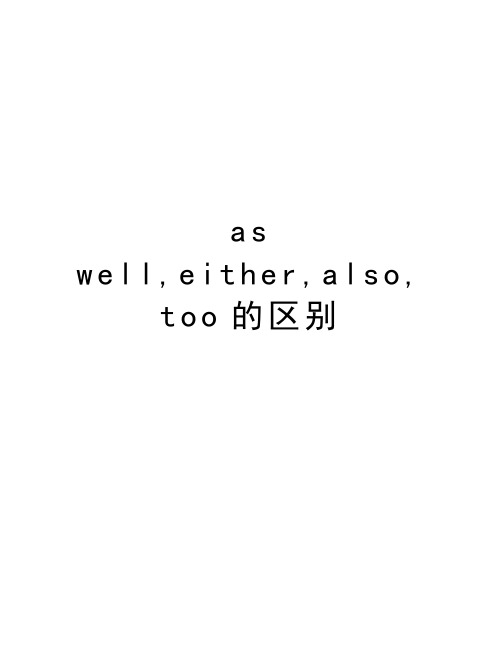
a sw e l l,e i t h e r,a l s o, t o o的区别精品资料as well, either, also, too的区别1.also用于肯定句,既可表示两人干了同样的事,也可表示一个人干了两件事,通常位于be动词,助动词或情态动词之后,行为动词之前。
如:He has been to Beijing. I have also been there.他去过北京,我也去过。
He is good at English. He is also good at Japanese.他擅长英语,也擅长日语。
I also wants some tea.我也要点茶。
注意:表示强调时,also也可放在助动词或情态动词等之前。
比较:I can also do it.我也能干。
I also can do it.(同上)2.too也用于肯定句,比also更通俗,和also, as well可以相互替换,可放在句中,也可放在句末。
如:Xiao Li went to Beijing and Xiao Zhao, too, went to Beijing.小李到北京去了,小赵也到北京去了。
He studies hard and I study hard, too.他学习用功,我(学习)也用功。
3.either用于否定句,而且只能放在句末。
如:He didn’t know it.I didn’t know it either.他不知道那件事,我也不知道。
I can’t speak French and can’t write it, either.我不会讲法语,也不会写法语。
4.as well在口语中用得很多,用法和too完全一样,可以互换,通常位于句末。
[见as well, as well as条]。
如:She not only sings,she plays the piano as well.她不但会唱歌,而且会弹钢琴。
also, too, as well, either的区别、用法及练习题(附答案)

also, too, as well, either的区别、用法及练习题1.also, 用于肯定句中,表示“也”的意思。
如:Jane speaks French. Sam also speaks French.He loves chocolate. I also love pizza.Frank can come with us. Nancy can also come with us.also在句子中的位置,主要有四种情况:(1) 放在be动词之后。
如:I am also Canadian.I was also there.(2) 放在实义(行为)动词之前。
如:I also sing.He also helped us.(3) 放在助动词、情态动词之后。
如:I have also been to Hong Kong.I am also studying economics.I can also speak French.I should also be there.(4) 放在句首,用逗号隔开,表示强调。
如:It’s very humid. Also, you can easily get sunburnt.It is a small house. Also, it needs a lot of repairs.2.too, 用于肯定句中,表示“也”的意思。
如:Jane speaks French. Sam speaks French too.I love chocolate. I love pizza too.Frank can come with us. Nancy can come with us too.too, 在句子中的位置,主要有两种情况。
如:(1)放在句子末尾,可以用逗号隔开,也可以不用逗号隔开。
如:David is a teacher. His wife is a teacher, too. (用逗号隔开)David is a teacher. His wife is a teacher too. (不用逗号隔开)I can speak French too.I am studying economics too.If he wants to go too, he should meet us at 8:00.(2)插入句子中。
- 1、下载文档前请自行甄别文档内容的完整性,平台不提供额外的编辑、内容补充、找答案等附加服务。
- 2、"仅部分预览"的文档,不可在线预览部分如存在完整性等问题,可反馈申请退款(可完整预览的文档不适用该条件!)。
- 3、如文档侵犯您的权益,请联系客服反馈,我们会尽快为您处理(人工客服工作时间:9:00-18:30)。
t o o e i t h e r a l s o a s w e l l辨析及练习题
TYYGROUP system office room 【TYYUA16H-TYY-TYYYUA8Q8-
t o o,e i t h e r,a l s o,a s w e l l辨析及练习(25题)too放在句子末尾,通常用逗号隔开.
either在否定句中使用,但是放在句子末尾,通常用逗号隔开.
also则放在系动词be之后,实义动词之前.
as well 用在肯定句中,放在句子末尾.
选择too,either,also,as well填空。
soup is not easy, and being a good chef is not easy, ________
gave me advice and money ________.
3. He will go to town tomorrow, I shall ________ go.
4. I can't play the piano. He can't, ________.
5. My father likes reading, and I do,________.
like you________
they coming ________
he wants to go ________, he should meet us at 8:00.
can come with us. Nancy can come with us ________.
am Canadian ________.
can speak French ________.
love chocolate. I love pizza ________.
am studying economics ________.
doesn't speak French. Sam doesn't speak French ________.
speaks French. Sam speaks French________.
don't love chocolate. I don't love pizza ________.
cannot come with us. Nancy cannot come with us ________
have ________ been to Hong Kong.
am ________ studying economics
20. I am a student, ________.
21. Lucy doesn't go to the party, ________.
22. Li Ming ________ took part in a ceremony.
23. She has knowledge and experience ________.
24. Bill can't stand game can't stand them,________.
25. I ________have to finish my work today.。
